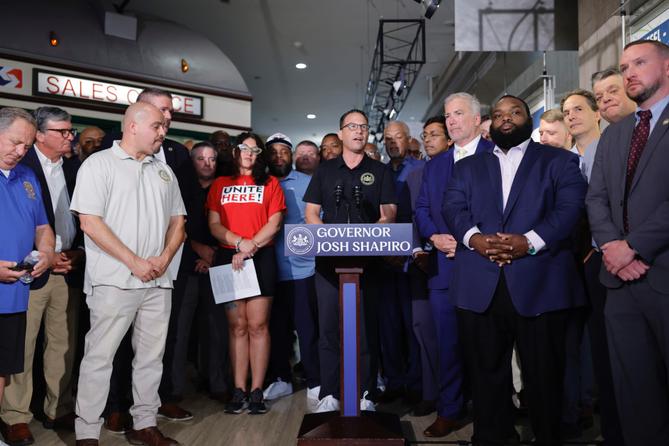HARRISBURG — Pennsylvania’s biggest transit system plans to dramatically cut service unless state lawmakers agree on a plan to send it more funding by the end of this week.
It’s unclear if the legislature will meet that deadline, as Republican leaders suggest public transit agencies already have plenty of money available and that the state should pass a stopgap budget to keep funding flowing.
Lawmakers in the Democratic-controlled state House passed a bill Monday that would send more funding to Philadelphia's struggling SEPTA and smaller systems across the state, as well as route new money to roads and bridges — a GOP priority.
The Republican-controlled state Senate remained out of session Monday, with Majority Leader Joe Pittman (R., Indiana) holding an all-day golf fundraiser in Indiana County. (Participants could spend anywhere from $125 for dinner to $10,000 to be a “diamond sponsor.”)
The upper chamber plans to return to session Tuesday.
Transit funding remains a major sticking point as legislative leaders continue to negotiate a state budget that is now six weeks late. The state has already begun to miss payments due to the impasse, and the Shapiro administration estimates it will need to delay at least $2.5 billion for schools, counties, and key service providers.
State Senate President Pro Tempore Kim Ward (R., Westmoreland) suggested last week that if a full budget deal remains out of reach much longer, members should pass a six-month stopgap to keep essential state services funded — something Democratic leaders and Gov. Josh Shapiro say they don’t support.
The transit funding proposal the state House passed Monday is modeled in part on previous pitches from Shapiro and other Democrats. It would increase the amount of state sales tax revenue transferred to public transit by 1.75 percentage points.
But in a nod to Republican priorities, it would include $600 million in bonds to fund road construction, about half of which would be earmarked for rural areas. It would also add accountability standards for public transit, including tracking large agencies' enforcement of fare evasion — another GOP ask.
It passed 108 to 95 with support from a number of Republicans, mostly from Southeast Pennsylvania, where SEPTA funding is a pressing concern.
But on the state House floor Monday, GOP leaders predicted a chilly reception in the state Senate.
“A budget will not be complete with the passage of this bill today,” state House Minority Leader Jesse Topper (R., Bedford) told his colleagues.
He accused Democrats of playing “the blame game” with the state’s overdue budget, and said the lower chamber’s action on SEPTA “moves us farther away than closer.”
In a news conference after the vote, state House Majority Leader Matt Bradford (D., Montgomery) called the looming SEPTA cuts a “man-made” crisis caused by Senate Republicans’ inaction. Bradford said Democrats tried to address a host of concerns voiced by Republicans, including safety and security on SEPTA and funding for roads and bridges.
“This does not need to happen,” Bradford told reporters of SEPTA’s looming cuts. “The Senate needs to show what its plan [is] to pass recurring revenue for transit as well as the state budget.”
A spokesperson for the state Senate did not immediately return a request for comment about the chamber’s plans.
But Ward, a key leader in the upper chamber, has lately made no secret of where she stands on SEPTA funding. In social media posts and media appearances over the past week, she said repeatedly that the state could take money out of its Public Transportation Trust Fund to temporarily cover SEPTA operating expenses while the legislature works on a longer-term solution. Democrats have countered that these funds are already earmarked for system upgrades.
Ward also proposed another stopgap — a “six-month budget” that would direct spending through the end of the year.
“There is a way that we can fund essential services, like social services and hospitals and nursing homes,” she said on a radio show last week. “For us to hold everybody hostage because we can’t agree on mass transit and education issues is a travesty.”
Bradford rejected that idea.
“Frankly, the idea of a six-month budget when you're already two months into the six months is laughable,” Bradford told reporters Monday.
SEPTA, which serves more than 700,000 daily riders across Southeast Pennsylvania, says it will move forward with its first phase of service cuts if the legislature doesn’t pass more funding by Friday. Cuts would begin Aug. 24, the agency said.
This 20% cut to all SEPTA services would include getting rid of 32 bus routes, reducing the number of train trips, and axing heavily used special express trips, like those to sporting events.
Agency spokesperson Andrew Busch told Spotlight PA that SEPTA would be able to reverse these cuts if lawmakers eventually approve new funding, but the reversal won’t be instantaneous. At the very least, Busch said, full restoration would take “at least two weeks from whenever funding is approved.”
He added that the agency plans to implement a hiring freeze in September as part of its service reduction, which, along with normal operator attrition, could leave SEPTA without enough people to fill crucial positions, like bus drivers. That is also “going to have an impact on our ability to restore service,” Busch said.
